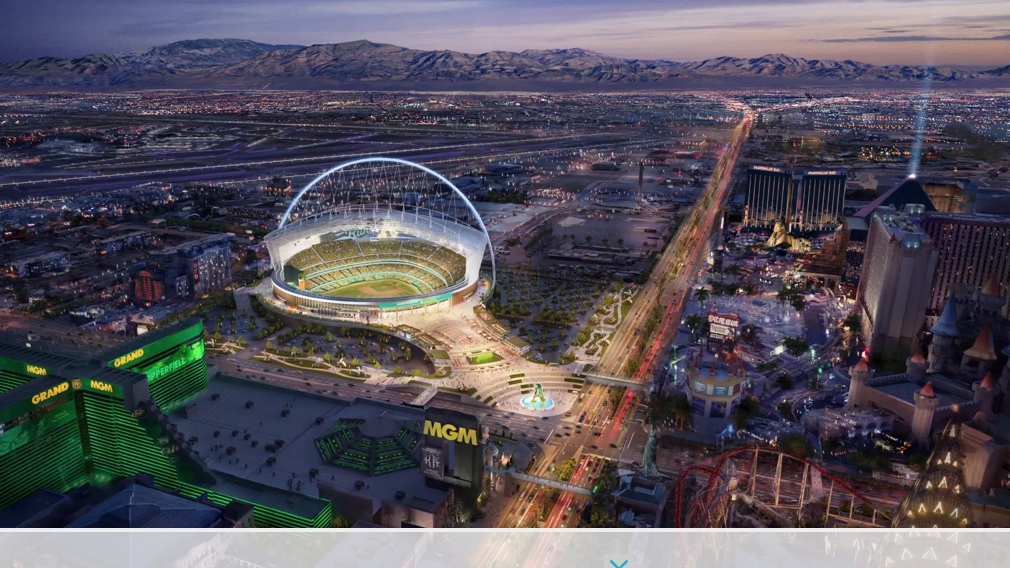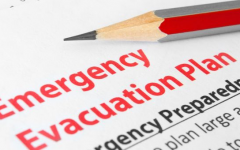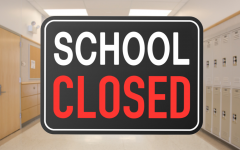
Rendering of the proposed A's baseball Stadium in Las Vegas (Photo: The Athletics)
Schools Over Stadium Strikes Out With Supremes
The NV Supreme Court has upheld a lower court ruling rejecting a referendum petition to block public funding to move the Oakland A’s to Las Vegas
By Megan Barth, May 13, 2024 12:20 pm
The Nevada Supreme Court has upheld a lower court ruling that rejected the language of a referendum petition to overturn Senate Bill 1, the public financing legislation needed to move the Oakland A’s to Las Vegas. The higher court agreed that the petition was “legally deficient” and “confusing.”
In a statement released on X, formerly Twitter, Schools Over Stadiums expressed their disappointment in the ruling yet they “remain committed” and will be organizing and refiling the petition for the 2026 election.
🚨Statement on Supreme Court Ruling#SchoolsOverStadiums remains committed to stopping Nevada tax dollars from paying for a stadium for a California billionaire, and we are disappointed Nevada voters will not have their say in 2024. pic.twitter.com/i1ZIEp31k3
— Schools Over Stadiums (@EduOverStadiums) May 13, 2024
According to a poll conducted last month by Emerson College, 52 percent of respondents were opposed to using public funds for the A’s baseball stadium at the former Tropicana Hotel site, however reports have recently emerged that the exact location of the stadium on the site is still TBD.
Sports Illustrated reports:
We’re still waiting for details on how owner John Fisher will pay for the project. He says that it will be a combination of debt and equity financing, and reports are saying that he’s looking for $500 million in investments by selling part of the team. Problem is, he’s looking for a valuation for what he projects the team will be worth once he has a new ballpark. To get that ballpark he needs investors, so you can see why they may be a little wary of just handing over money.
Fisher’s team is not worth the money he’s looking for unless he gets money from someone else. As if that isn’t enough of a big red flag for potential investors, the A’s also lost $11 million last season playing in the Bay Area. Baseball prints money. You know how hard it is to not make at least a little? The San Diego Padres also lost money last year, but that’s because they ran a payroll of $255 million. The A’s had a payroll of $59 million, or just about $200 million less.
Finding someone to invest is going to be tricky unless Fisher adjusts his methodology.
From the jump it seemed like they didn’t have a plan in Las Vegas and have just been flying by the seat of their pants throughout this entire complicated relocation process.

The process has been complicated from the jump, requiring a special session of the Nevada legislature accompanied by numerous amendments and legislative wrangling and concessions to pass the budget.
During the negotiations, a bipartisan group of lawmakers, progressive activists and the NSEA pushed back against the proposal, stressing that the monies used for a baseball stadium should be used for education, infrastructure and government services. They also highlighted the A’s abysmal stats and poor attendance as reasons to avoid public financing and related risk.
Ultimately, the bipartisan legislation passed, approving $380 million in public funding to the struggling team.
The state will provide $180 million in transferable tax credits and Clark County will issue $120 million in bonds. A newly created entertainment district would collect tax revenue from the surrounding businesses to pay down the bonds and interest.
Playing ball in Las Vegas not only comes with peanuts, popcorn and crackerjack, but demands for “equity.” The Globe exclusively obtained the “Community Benefits Agreement” included as an amendment in the legislation.
In total, there are 13 provisions to this binding agreement. Here are the highlights that the A’s, any development partner and stadium operator must provide:
- Construction Workforce Diversity –Attain a minimum of 51% of construction work hours to be performed by construction contractors of any level during construction of the project by minority, female, veteran and disabled workers.
- Stadium Operations Workforce Diversity — Attain a minimum of 60% of event operations work hours to be performed by minority, female, veteran and disabled workers.
- Subcontracting/Vendor Diversity — Ensure small business and nonprofit subcontractors/vendors in the construction and operations are diverse and include minority, women and disabled owned businesses. The A’s shall ensure that not less that 15% of the project’s direct construction cost is allocated to Nevada small business.
- Appreciation Nights and Awareness Days — Days will include, but not limited to, Asian American and Pacific Islander Heritage, Indigenous People’s heritage, Pride, Juneteenth, African American heritage, Latin and Hispanic Heritage, Earth Day, hunger action awareness, and disability awareness. (Editors note: no apologies given to everyone else who was excluded from appreciation.)
- Improvement of community fields — Renovation efforts will target the urban and rural underserved communities throughout the state of Nevada.
- Development of an Art plan to “support the overall baseball experience.” (Editors note: If you’re not interested in baseball, perhaps a transgender art exhibit served with a Bud Light will bolster attendance?)
- Employee Relief Fund — Provide financial assistance to employees who are facing financial hardship. Grants are intended to cover expenses including, but not limited to, mortgage or rent for a primary residence, essential utilities (gas, water, electricity), food supplies, childcare, and significant medical expenses. (emphasis added)
- Pre-opening Annual Contribution — Prior to opening day of the stadium, the Team will contribute a minimum of $500,000 per year to support community needs outlined in this document and included, but not limited to, mental health, healthcare access, youth development, domestic violence, substance abuse disorders, veterans services, human trafficking, food insecurities, and homelessness.
- Minimum Financial Commitment — Community benefits describes will be supported with cash and in-kind donations from the Team totaling at least 1% of annual ticket sales. The contribution shall be the greater of 1% of annual ticket sales, or $2,000,000.
Lots of “equity” talk for America’s favorite past time as time passes quickly and time costs money. Yet, there is not much time to break ground on the new billion dollar stadium as the A’s expect to play their first game on the Las Vegas Strip at the start of the 2028 baseball season.
The Globe will continue to provide updates to the Oakland A’s relocation to Las Vegas.
- Illegal Alien Identified As Wrong-Way Driver in Fatal Crash That Killed LVMPD Officer - December 23, 2024
- Senator Rosen Joins Letter Raising Concerns About Pete Hegseth’s Nomination - December 20, 2024
- NV SOS Launches Four Investigations Into 2024 Election Violations - December 20, 2024




